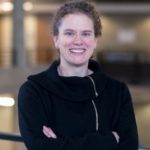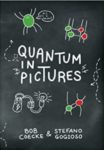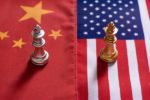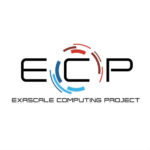In this episode of the “Let’s Talk Exascale” podcast, the Exascale Computing Project’s (ECP) Scott Gibson talks with Katherine Riley, director of science at the Argonne Leadership Computing Facility. Her mission is to lead a team of ALCF computational science experts who work with facility users to maximize their use of the facility’s computing resources. […]
Let’s Talk Exascale: ALCF’s Katherine Riley Talks Aurora Deployment, Impactful Science and Partnering with ECP
@HPCpodcast: ‘Quantum in Pictures’ Author Bob Coecke
The HPC community is a very intelligent bunch, as a rule, but a few segments of the industry call for an exceptional, Himalayan level of smarts. One of them is quantum. Conversing – or trying to converse – with a quantum computing specialist is for most of us a withering and futile experience from which we emerge feeling strangely reduced. Quantum people speak a language we don’t know and play a sport we’ve never seen, yet we very much want to understand both. Quantum could change the world. But how? Into this opaque arena comes Bob Coecke, chief scientist at quantum company Quantinuum, who is co-author with Stefano Gogioso of the recently-released Quantum in Pictures: A New Way to Understand the Quantum World, which is intended to make quantum more accessible.
@HPCpodcast: IBM’s AI Supercomputer, Quantum in the News and Google’s Bard vs. Bing’s ChatGPT
In our latest @HPCpodcast episode, Shahin and Doug discuss the latest HPC industry news, including several quantum computing developments, Google’s “Bard” generative AI response to the Chat GPT phenomenon, IBM’s “Vela” cloud-native AI supercomputer (powered by Intel Cascade Lake CPUs and NVIDIA A100 GPUs – and a general discuss of IBM’s evolved position in the HPC-AI industry.
@HPCpodcast: On ‘Myths and Legends of HPC’ with the RIKEN Center’s Satoshi Matsuoka and Torsten Hoefler, ETH Zurich
There are so many great tech ideas, but how do you assess which ones will impact HPC? How do we filter out hype? In a new, future looking paper entitled “Myths and Legends in High-Performance Computing,” Satoshi Matsuoka, Jens Domke, Mohamed Wahib, Aleksandr Drozd, and Torsten Hoefler tackle 12 important topics, from major technology areas to specific capabilities and applications in HPC systems to come. In this episode, we talk with Satoshi and Torsten (one of them in an airport) about their paper, which helps formulate the right questions and initiates important discussion points by posing the topics as myths and legends in an enjoyable and humorous paper.
@HPCpodcast: Who’s Winning the High-Stakes U.S-China AI Race?
If you’re concerned about the advanced chip competition between the U.S. and China – and who isn’t? – then this week’s @HPCpodcast guest offers much food for thought. Handel Jones, founder and CEO of the International Business Strategies consulting firm, is the author of a new book, WHEN AI RULES THE WORLD: China, The U.S., And The Race To Control A Smart Planet. He contends that China is winning the AI race in part because the leadership of the PRC regime is more competent and technically astute than some in the West may think.
@HPCpodcast: Our Favorite 2023 Predictions, Puncturing the Myths of HPC and New Advanced Chips
In our opening episode of 2023, Shahin and Doug discuss the recent chip announcements from Intel and AMD and their implications for HPC. We also talk about are industry predictions for the year to come featured in this article on insideHPC — including the ones we think most interesting. We also discuss a recent paper from researchers in Japan and Europe — led by Satoshi Matsuoka of the RIKEN Center for Computation Science — on the 12 myths and legends of HPC, a buffet for thought.
@HPCpodcast Special Edition: 2022 in Review and What’s Ahead in 2023 for HPC
In this year-in-review double-issue episode of @HPCpodcast, Shahin and Doug continue what is becoming a tradition, a discussion of some of the notable developments, trends and news stories of the past year in HPC, including : HPC market growth, the U.S.-China supercomputing competition and trade war, the official arrival of exascale-class supercomputing, quantum computing, SC22, artificial intelligence (including “sentient AI”) and machine learning, Jack Dongarra’s ACM Turing Award, the criticality of emerging interconnect technologies, the defunct Nvidia-Arm deal, the CHIPS & Science Act and the push for domestic chip production in the U.S., HPC software and fusion energy.
Let’s Talk Exascale: The Why Behind HPC-class Scientific Simulations
This episode of the Let’s Talk Exascale podcast, produced by the U.S. Department of Energy’s Exascale Computing Project, features a discussion between ECP host Scott Gibson and Bronson Messer, who offers insights on computer modeling and simulation for advancing science. Messer is a distinguished scientist and director of science at the Oak Ridge Leadership Computing […]
@HPCpodcast: Chip War Author Chris Miller on the Escalating U.S.-China Technology Trade Conflict
The backdrop of this year’s SC22 conference is the rising trade conflict between the U.S. and China and the Administration’s increasing restrictions on exports of technology driving the development of advanced chips — the chips that poweer supercomputers. Our special guest on the @HPCpodcast is author Chris Miller, whose new book, Chip War, is a history and analysis of the growing role of the semiconductor industry in global economic and military competitiveness. Miller is associate professor of international history at Tufts University’s Fletcher School of Law and Diplomacy….
@HPCpodcast: UC Berkeley’s and LBNL’s Kathy Yelick on Exascale, the Future of Supercomputing, Partitioned Global Address Space and Diversity in HPC
Today, on the eve of Exascale Day, the @HPCpodcast is delighted to have Kathy Yelick as our special guest to observe Oct. 18 (1018 – a billion billion calculations per second). Dr. Yelick is the Robert S. Pepper Distinguished Professor of Electrical Engineering and Computer Sciences and the Vice Chancellor for Research at UC Berkeley, and Senior Faculty Scientist at Lawrence Berkeley National Laboratory.











